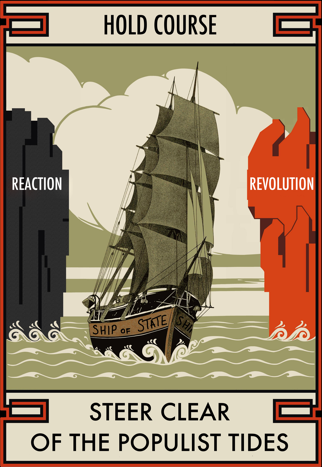Analogy
An analogy is a mapping between descriptive models. While a model provides a useful structure for reasoning about a thing, the structure also sets limitations on how far the reasoning can be taken. If the model isn't a perfect simulation, these limitations are then artificial, and we frequently might want to step beyond their bounds. Shifting to another analogous model is one means of overcoming these limitations (the other being broadening of scope; which may come with higher complexity penalties).
Consider the Ship of State. In this analogy, the body of the state is analogized to being a ship [1].
- The ship has a captain, as a state has its leader(s).
- The ship has a great bulk, and moves in a cumbersome, and somewhat unweildy fashion, just as a state has great momentum, and will sometimes respond sluggishly to its leaders direction.
- The ship must contend with weather, with storms, with currents, and other forces that push it about, just as a state may be buffeted by global economics, mass migrations, pandemics, and other forces.
- The ship must be handled carefully to avoid dangers like shallow shoals, reefs, and rocks, just as a state much carefully avoid provoking protests, disobedience, and the twin dangers of populism [2].
- The ship is bound by a covenant and a contract among the sailors, just as a state may be bound by a constitution and law.
[1]It's actually a really good analogy. For some other analogies, see the brain as a recursive filter →, and perspective as glasses →.
[2]
In general, analogies should be used for pedagogy only. If a person doesn't know much about a thing, comparing it to an analogous thing for which they have greater familiarity is an excellent means of helping them to grasp the idea.
The flip side of this is that analogies should not be used for argumentation. Each mapping from one model to another analogous model introduces errors into the final result. If you're arguing from an analogy, you are running a heightened risk of simply being wrong. Nevertheless, this generally doesn't stop arguments from analogies; getting the audience to understand your argument is the largest hurdle in getting them to believe it to be true.
The most common problem that analogies encounter is overextension. In overextension, one model is analogized to another, then reasoning is expanded in that other model, then the analogy is brought back to the first model, but the result is incongruous.
Consider the following overextensions with our ship of state:
- Wind is the economy, driving the motion of the state. When a ship hits becalmed seas, there's nothing to be done but wait it out, so therefore when a state's economy stagnates, the correct course of action is to wait it out.
- When a ship sets sail, it must have all the provisions that it needs for the following journey. Therefore, at the beginning of every year, the state should have stockpiled all the resources it will consume until the next year.
